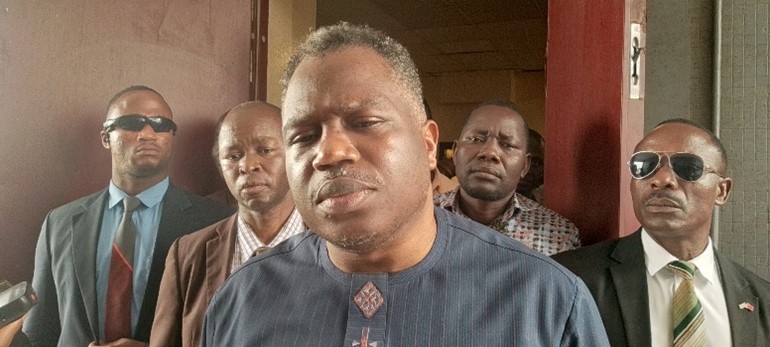Liberia is grappling with an escalating cost of living crisis, fueled by a surge in commodity prices that is causing widespread anxiety among its citizens and businesses. At the heart of the issue are accusations leveled against APM-Terminals and the National Port Authority (NPA), entities responsible for port operations. Importers and businesses contend that these organizations are implementing monthly fee increases on imported goods, directly contributing to the rising costs of essential commodities like rice and petroleum. These goods hold significant political weight in Liberia, making their price fluctuations a particularly sensitive issue.
The severity of the situation has prompted President Joseph N. Boakai to establish an ad-hoc committee to investigate the root causes of these escalating prices. This committee, chaired by Vice President Jeremiah Koung, held its inaugural public-private dialogue on August 20, 2025, providing a platform for businesses to air their grievances. The meeting saw the participation of key figures from the Central Bank of Liberia, the Ministry of Finance and Development Planning, and the President’s Security Advisor, underscoring the government’s recognition of the gravity of the situation. Vice President Koung expressed concerns that the unrelenting price hikes could potentially ignite public unrest, emphasizing the government’s commitment to address the issue promptly. A meeting with APM-Terminals and the NPA was scheduled to discuss the concerns raised by the business community. The Vice President stressed the importance of controlling prices, especially for politically sensitive commodities like rice and petroleum, and indicated the President’s readiness to take appropriate action to stabilize the market.
The Presidential Ad-hoc Committee’s investigation encompasses a wide range of goods, extending beyond basic necessities like rice, flour, and petroleum to include everyday food items like eggs, frozen foods, sugar, chicken soup, pepper, potatoes, and greens. This comprehensive approach demonstrates the government’s commitment to understanding the price dynamics across the entire consumer market. The committee’s initial meeting involved key stakeholders, including regulators like the Liberia Petroleum Refinery Corporation (LPRC) and various importers, signifying a collaborative effort to gather information from all relevant parties. The investigation, spanning ninety days with the possibility of extension, aims to provide a detailed analysis of the factors contributing to the price increases.
While the committee is actively engaging with stakeholders, Vice President Koung has emphasized the confidential nature of the ongoing investigation. Details of the proceedings and preliminary findings will not be publicly disclosed until a comprehensive report is submitted to President Boakai. This approach ensures the integrity of the investigation and allows the President to address the nation with a complete picture of the situation and a clear plan of action. The Vice President also clarified that the perceived delay in action, attributed to a 44-day period without visible measures, was due to the committee officially receiving its mandate from the President on August 15, 2025, despite the initial announcement in late July. Since then, the committee has expedited its efforts to engage with all pertinent parties.
The rising commodity prices in Liberia represent a complex challenge with potentially far-reaching consequences. The government’s response, through the establishment of the ad-hoc committee, underscores the seriousness of the issue and the commitment to finding solutions. The investigation’s focus on both essential and everyday goods demonstrates a holistic approach to understanding the market dynamics at play. The inclusion of various stakeholders, from importers and businesses to regulators and government agencies, highlights the importance of collaboration in addressing this complex issue. The government’s commitment to transparency, as evidenced by the decision to withhold preliminary findings until the final report is submitted, aims to ensure the integrity of the investigation and provide the public with a comprehensive and accurate assessment of the situation.
The outcome of this investigation and the subsequent actions taken by the government will be critical in determining the trajectory of Liberia’s economic stability. The rising cost of living is a pressing concern for citizens, and the government’s ability to address it effectively will be a key factor in maintaining public trust and preventing potential unrest. The situation calls for a balanced approach that addresses both the immediate concerns of consumers and the long-term sustainability of the Liberian economy. The dialogue between the government and the private sector is a crucial step in this process, and the findings of the investigation will provide valuable insights into the underlying causes of the price hikes and inform effective policy responses. Ultimately, the success of these efforts will depend on the government’s ability to implement sustainable solutions that protect the welfare of its citizens and promote economic stability.














